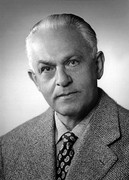 The continuous casting technology revolutionized the steel industry in the middle of the 20th century. The process enabled a higher productivity to be achieved than to date. Irving Rossi, founder of the Swiss company Concast, launched the technology on the market. For his achievements, he has now been awarded a place in the “Hall of Fame” of the American trade journal American Metal Market. “Thanks to Rossi, the American steel industry was able to develop to become one of the most productive in the world,” they explained.
The continuous casting technology revolutionized the steel industry in the middle of the 20th century. The process enabled a higher productivity to be achieved than to date. Irving Rossi, founder of the Swiss company Concast, launched the technology on the market. For his achievements, he has now been awarded a place in the “Hall of Fame” of the American trade journal American Metal Market. “Thanks to Rossi, the American steel industry was able to develop to become one of the most productive in the world,” they explained.
In the past century Rossi was considered an astute businessman with a good instinct for technical innovations. 235 patents were registered in his name, some of which did not develop their potential until decades later.
To this day, Rossi is mainly known for his contribution to continuous casting. He made history as the “Father of commercial continuous casting and mini steelworks”. In May 1949, Rossi transferred the casting process from non-ferrous metals to steel for the first time. This required a great deal of courage and perseverance. For the first production plants in the USA, the entrepreneur guaranteed the steel quantity and quality, and the investments turned out to be profitable. The process enabled the American steel industry to achieve an immense boost in productivity, and ensured its success for many years.
With the stationary process used until then casting took one to two days, as it had to pass through twelve different stations. Rossi’s continuous casting process, on the other hand, comprised only five stations and took just one hour to complete – with a material yield of over 90 percent.
Rossi took his know-how to Europe and in 1954 founded Concast in Zurich together with the later managing director, Heinrich Tanner.
As pioneer in continuous casting technology in the western world -the Soviet Union had already developed continuous casters earlier-Concast was for a time the only supplier of plants of this kind.
In 1961, at the age of 72, Rossi sold the company. But under the management of Heinrich Tanner, the success story continued. In the 1970s the market share in the field of continuous casters was as high as 60 percent, before reservations on the part of the anti-trust authorities necessitated a splitting of the business.
From 1981, SMS, Clecim (France) and Distington/British Steel (Great Britain) concentrated on the construction of plants for slabs and heavy plate. Concast Standard AG founded in the same year focused on the construction of casters for the production of billets (long products).
In 1996, Concast acquired ABB’s electric arc furnace division and the business was expanded to include electric arc furnaces and secondary metallurgical plant later on.
In 2004, SMS took over 100 percent of the Concast shares. The company became the successful full-liner for steel plants and continuous casters for long products.
Rossi died in 1990 at the age of 101. In this year, 455.17 million t of steel were cast continuously, corresponding to 59.15 percent of the world steel production – a share that without Irving Rossi could never have been achieved.
